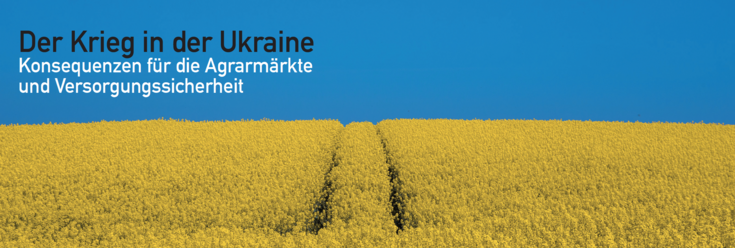22.03.2022 - BOKU: The war in Ukraine and the consequences for agricultural markets and security of supply

On the occasion of the current events, the BOKU Center for Agricultural Sciences and the Austrian Society for Agricultural Economics invited agricultural experts to a fact check - and to give their assessment of the situation.
There will be a re-live of the webinar, as soon as it is available you will find the link here.
Russia's war against Ukraine does not only mean a humanitarian catastrophe for the Ukrainian population, but has consequences far beyond Ukraine. For example, the war is triggering an unprecedented movement of refugees to neighboring countries and throughout the European Union. At the same time, the war and the international sanctions against Russia adopted in response are causing a significant rise in the price of many commodities.
"The war in Ukraine is also of significant importance for agricultural and food markets. For example, Ukraine is one of the world's most important producers of grains and oilseeds. At the same time, however, the war is also having a considerable impact on the prices of agricultural inputs," says Jochen Kantelhardt, head of the BOKU Center for Agricultural Sciences and president of the Austrian Society for Agricultural Economics. "In particular, the energy used in agriculture will become considerably more expensive, as will the prices of fertilizers, which are produced with high energy input," Kantelhardt says. So the war is likely to lead to rising prices in the food market, too. All these effects would affect numerous countries and markets, including those of the European Union and thus also Austria.
Food importers massively affected
The war in Ukraine is particularly affecting those countries that rely heavily on food imports. "Global food prices have been rising significantly for months due to rising energy costs, regional climate impacts and, most importantly, disrupted supply chains as a result of the covid pandemic. Prices are higher than those of the 2007/2008 food crisis, when it led to social and political unrest in Egypt, Tunisia, Libya, the Middle East and Central America," analyzed Fritz Gattermayer, a lecturer in world food economics and world agricultural markets from the Institute for Marketing and Innovation at BOKU.
Ukraine is one of the world's top exporters, with about 33 million tons of grain and about 17.5 million tons of oilseeds. Many countries in the Middle East, Africa and Asia are highly dependent on imports of Ukrainian wheat such as Lebanon (50%), Libya (43%), Yemen (22%), Indonesia (28%) or Egypt (14%). The Russia-Ukraine conflict exacerbates the tense situation, he added. Both countries emerged as very important exporters of grains, oilseeds, vegetable oils and feeds over the past 15 years.
"Whether and to what extent spring sowing will be possible is questionable. The regions most affected by the war so far account for about 50% of spring barley production, 30% of grain corn and more than 40% of sunflower. There will not only be problems with sowing and harvesting in Ukraine due to the acts of war, but also with transport and logistics as a result of the partly massive damage to storage and loading capacities," Gattermayer expects.
Agricultural production - the European Union remains an important factor on the world market
"For Austria, as part of the EU internal market and an important producer of high-quality food, the decisions taken at EU level are of particular importance," emphasized Christian Gessl, head of the Market Regulations and Market Information Department at AgrarMarktAustria (AMA). "A functioning internal market requires coordinated action within member states to continue to secure supplies and consolidate their share of supplying world markets."
The EU is the fourth largest corn importer on the world market. "To cover the deficit, Ukraine supplies about 50% of the required demand for corn every year," the AMA market expert said. The main regions affected, he said, are the Iberian Peninsula and the Baltic States. The weak point in the EU agricultural market is the protein demand in feeding. Approximately 14 million tons of soybeans and 16 million tons of soybean meal, which are imported annually, indicate the low degree of self-sufficiency of the EU market. The vegetable oil market would also be strongly affected. For example, 80% of the sunflower oil needed is imported from Ukraine, he said.
"Austria is located in the middle of a surplus region with grain surpluses in Hungary, the Czech Republic and Slovakia," Gessl added. This situation makes it possible to expand a strong processing industry and to supply the Italian market with top-quality Austrian wheat. The essential prerequisite for the exchange of goods continues to be the unrestricted movement of goods on the EU internal market. "Therefore, the development in Austria's neighboring countries in particular is of great importance with regard to the supply situation as well as possible precautionary measures."
Assessment of the consequences for farms in Austria
Franz Sinabell of the Austrian Institute for Economic Research analyzed how farms in Austria and the EU are affected by the war in Ukraine. He recalled that already in 2021, rising fertilizer costs and more expensive energy have led to high production costs. Better product revenues could only be achieved in some areas, especially in cash crops. In the end, an increase in real agricultural income per full-time employee of 3% compared to 2020 remained from a 10% higher production value. "It is too early to estimate consequences for the income situation, but the even stronger increase in costs for energy and inputs show the channels through which agriculture is already directly affected," said the WIFO expert.
